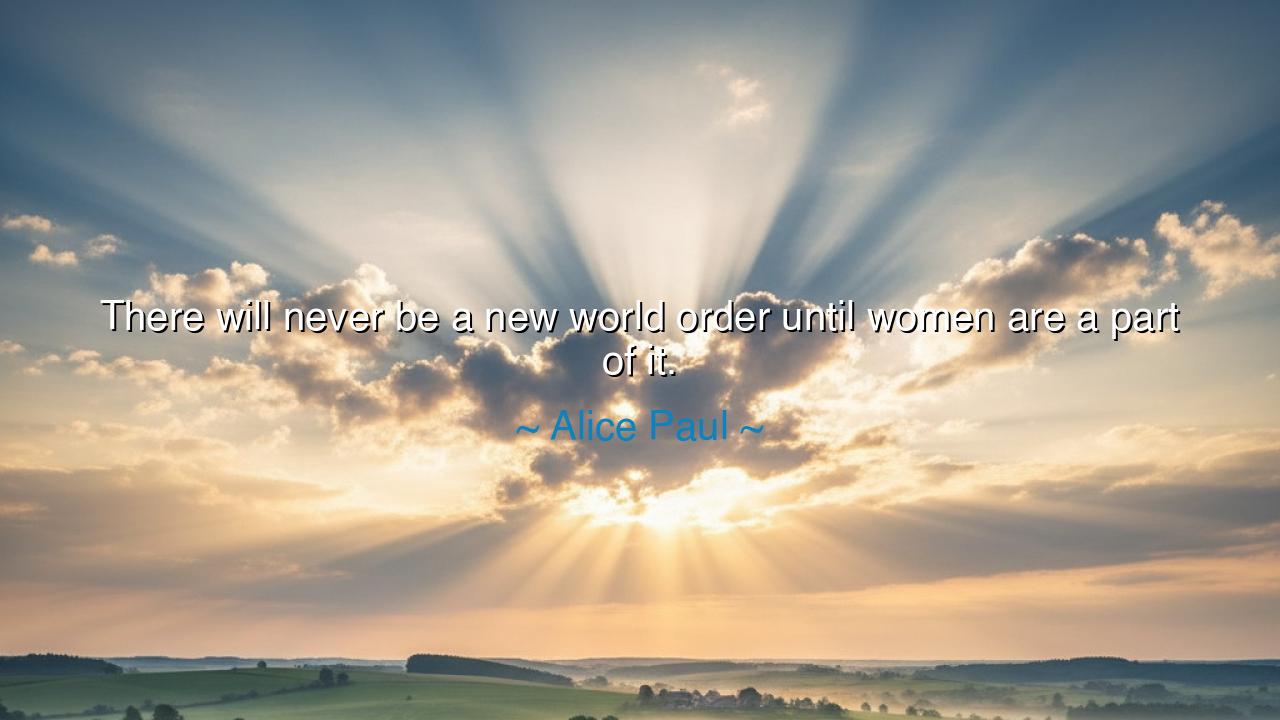
There will never be a new world order until women are a part of






The words of Alice Paul — “There will never be a new world order until women are a part of it.” — resound like a prophecy for the ages. She, a warrior of the suffrage movement, spoke not merely of ballots and laws, but of the destiny of civilization itself. For she knew that no true renewal of the world could be born while women were excluded, their voices silenced, their strength ignored. A new world order, to her, was not a change of rulers alone, but a transformation of justice that demanded the presence of both halves of humanity.
The meaning of her words lies in the conviction that progress cannot be partial. Nations may change kings for presidents, empires for republics, yet if women remain barred from the halls of power, the world is not new but only old chains in new form. Alice Paul declared that without equality, revolutions are incomplete, and without the partnership of women, humanity limps with half its strength. The new world order she envisioned was not domination, but harmony — a society rebuilt upon the pillars of both men and women standing as equals.
History bears the weight of her truth. For centuries, women were denied the vote, their voices drowned by the chorus of men. Yet through hunger strikes, protests, and relentless courage, leaders like Alice Paul broke open the gates of democracy. The victory of the Nineteenth Amendment in 1920 was not only a triumph for American women but a sign to the world: the order of nations could never be whole until women were woven into its fabric. And still, her words echo, reminding us that political rights alone are not enough — the deeper struggle is for women to be present wherever power is wielded.
The origin of her declaration rests in her own life of unyielding resistance. She marched, was imprisoned, endured violence and scorn, yet never relented. Her vision of a new world order was forged in suffering, but also in faith — faith that humanity could rise above its old oppressions and discover its greater strength in equality. Her words are both a promise and a warning: the future cannot be built on half a foundation.
Therefore, O children of tomorrow, remember this: no empire, no democracy, no global order will ever be just or enduring until women stand as co-creators of its destiny. The presence of women is not an ornament, nor a concession, but the very condition of renewal. As Alice Paul teaches, the dawn of a truly new world awaits the day when every voice is heard, and every hand is free to shape the future. Only then will humanity rise to its full height, and only then will the order of the world be worthy of its name.






GDGold D.dragon
This quote speaks to a fundamental truth: societies can only evolve if they embrace inclusivity at every level. But how do we ensure that women’s participation in shaping the future is not tokenistic or surface-level? What are the barriers that still prevent women from being equal contributors to global progress, and how can we remove them? Could the exclusion of women from political and economic spheres be why so many global issues remain unresolved?
AQluu huynh anh quang
I agree with Paul’s assertion that women must be included in the creation of a new world order. But is it enough for women to simply be present in leadership positions, or do we also need to change the way power is distributed? How can we challenge the deeply ingrained systems of inequality that still exist? Can we truly build a new world order without addressing the root causes of these power imbalances?
TThinh
Paul’s quote suggests that true global progress cannot happen unless women are actively involved in shaping it. But does this mean that the world has not progressed because women have been sidelined, or does it imply that the system needs to be restructured to make room for diverse perspectives? How can we ensure that women’s voices aren’t just heard but also given the power to create change at every level?
NHNg Huyen
Alice Paul’s statement highlights a crucial point about gender equality in the context of global change. Can we truly envision a ‘new world order’ without fully including women in leadership and decision-making processes? What does this say about the current structures of power and their limitations in fostering real progress? Are we setting ourselves up for failure if we exclude half of the population from creating solutions for the world’s problems?